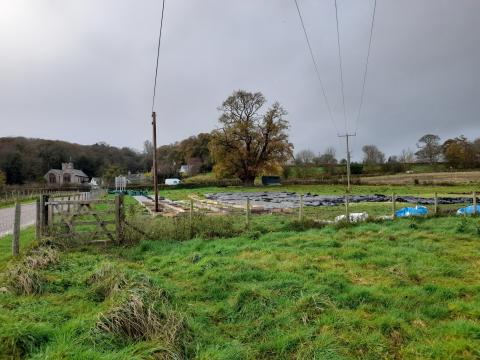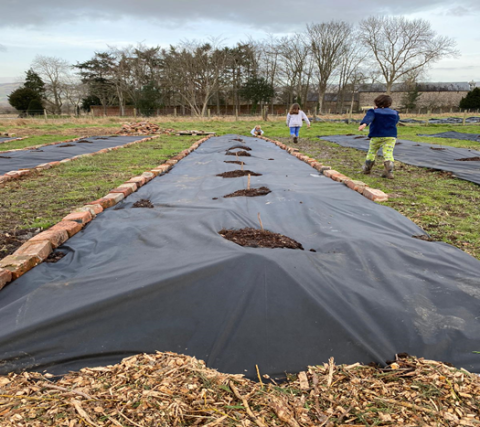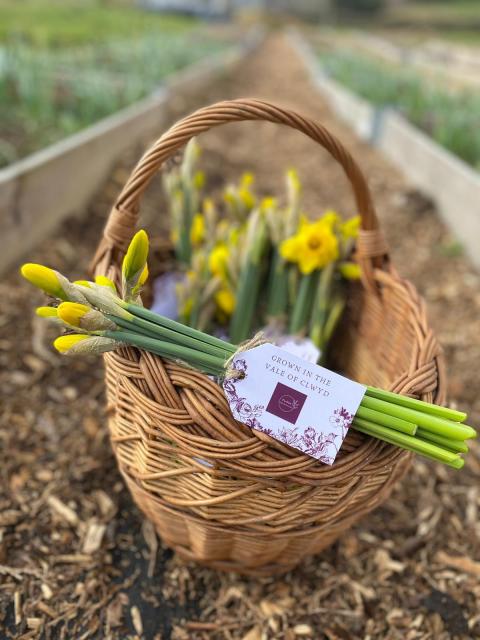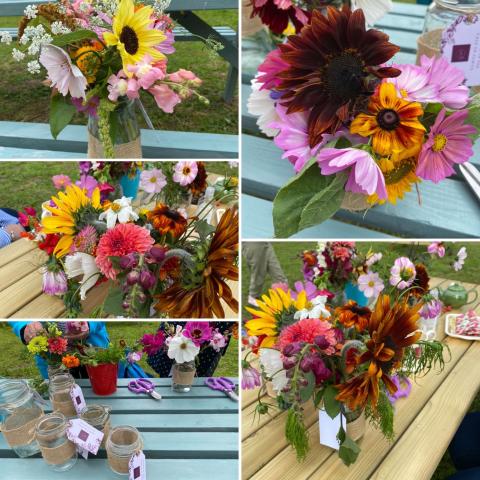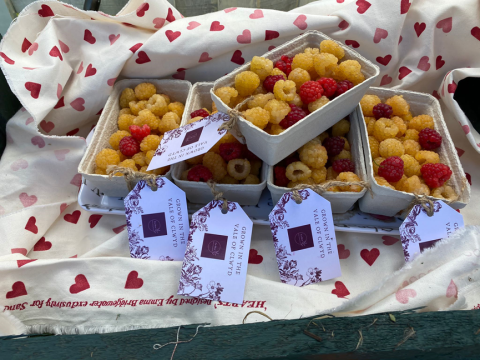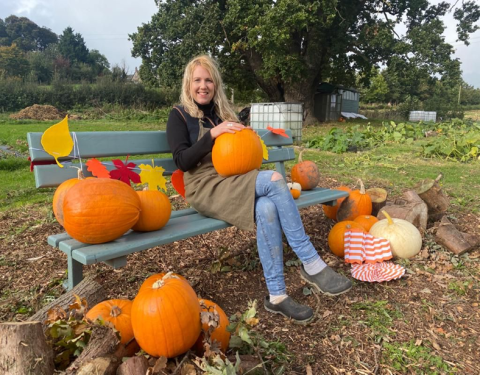Cae Derw Final Report: Diversifying into horticulture and establishing a pick-your-own enterprise using the no-dig method
Introduction
Lucy Owens is originally from Leicestershire, and the family dairy and sheep farm is near Melton Mowbray. Lucy studied BSc (Hons) Agriculture with Marketing at Aberystwyth University, and is currently farming around 100 ewes in Wales with her father-in-law. Apart from a paddock at home in Rhewl, all land is rented. Lucy was also a member of Farming Connect’s Agri Academy 2019.
The pick-your-own (PYO) market has evolved over the last decade from the traditional production-focused enterprise towards experience-based, on-farm tourism. Social media and demand for a local value-based family days out in the countryside has fuelled this demand. Being less motivated by crop production, this provides opportunities for family farm units – even those more remotely located – to build an alternative income-generating enterprise that can be scaled according to individual resources and labour availability throughout the year.
This emphasis on selling locally via short supply chains provides for enhanced environmental credentials, and can offer seasonal access to a wide range of crops, while pop-up opening offers scope to control visitor numbers according to produce availability.
Lucy is familiar and skilled with social media for marketing and promotion of the enterprises; this will facilitate access to customers and the creation of a booking system to control visitor numbers. The land at Cae Derw also provides recreational space for the family.
Objective
The main objective was to grow as naturally and ecologically as possible, using local resources, such as peat-free compost and cattle and sheep muck from the next farm.
Produce grown will be targeted at the PYO market and to provide opportunity for people to spend time outdoors and connect with local food production. The plan is to have crops available for public access from March to October, beginning with daffodils and other bulbous flower crops through to soft fruits, field flowers, and finishing with pumpkins for Halloween.
The no-dig system using raised beds suits this type of enterprise, and once established, the beds can be used for a range of crops. The system does not require much maintenance, and public access is good, via the network of pathways. Cropping is also easily changed if chosen enterprises do not perform. With PYO, presentation is vital, therefore the raised beds need to look attractive, ensuring crops are shown off to best advantage.
The aims of the project were to:
- Explore the no-dig method to develop fruit and vegetable beds
- Compare sheep’s wool against cardboard as a weed suppressant mulch
- Develop raised flower beds for pick-your-own
- Develop a pumpkin pick-your-own enterprise
What was done
The site is adjacent to the main Ruthin to Denbigh road, with hard-core access and parking area; this aids marketing and access, which are important considerations when planning an enterprise of this nature. There are also attractive features on site, including a small stream, an ancient oak tree and countryside views all round, which contribute to the enjoyment of the public visiting the site.
The chosen parcel of land had previously been used for growing crops. There is a well on site, and the area is approximately 0.5ha (1.2 acres). There is easy access from the main road, and a shed on site to store equipment.
The soil on the site is sandy loam in texture, and soil analysis showed a suitable pH level and appropriate nutrient indices (Table 1). Soil profile pits were dug to a depth of 60cm to enable exploration of the soil profile.
Table 1: Soil analysis
Late in 2020, the work started with setting up the beds. No-dig is a growing system where the soil is allowed to build up structure and health without using mechanical cultivation, and weeds are controlled by using mulches and ground cover material which can be cardboard, manures, or woodchip. In this case, raw wool fleece and Mypex (a ground cover textile) was used. Wool fleece breaks down gradually to supply organic matter and slow-release nitrogen for up to three years or more, and provides a positive use for poorer quality or dirty wool. There was some evidence of surface compaction, so limited tilling of the turf was conducted to aerate the soil before covering it.
Planting was done through small holes in the Mypex cover, which reduced hand weeding to a minimum. Mypex will last at least 10 years if weeds are not allowed to grow on it; as the crops being grown are mainly annuals, this provides opportunity to build a rotation to prevent soil-borne disease build-up.
Woodchip paths and brick edging, February 2021
Flowers were grown from seed off-site, starting with sowing in October 2020 to provide early flowers in 2021. In March 2021, a polytunnel was installed on site to propagate plants.
In February, soft fruits were planted: Autumn Bliss and the yellow-fruited All Gold raspberries. These varieties are robust autumn-fruiting or primocane raspberries that fruit on the current season’s growth, and so give a good crop in the planting year. Rhubarb was also planted.
Flowers were chosen to provide colour and interest through the seasons and included:
Daffodils
Tulips
Anemones
Ranunculus
Salvias
Lavender
Rosemary
Bells of Ireland
Snapdragons
Sweet peas
Amaranthus
Cerinthe
Dahlias (different sorts)
Sunflowers (assorted colours)
Scabiosa
Zinnias
Roses
Nigella
Cornflowers
Gladioli
Results
All the crops developed well, and marketing started early, with bulb flowers from the previous autumn’s plantings being picked from March to May. The beds and paths were working well, and the visuals were attractive. A social media campaign was started before the crops were ready, with continually increasing numbers of followers. Attractive photos of PYO flower arrangements labelled with a local provenance aided presentation of the site.
First flowers sold March 2021
Starting with the daffodil sales in March, the response from the public was excellent, and the online booking systems were working well. Flowers are a useful crop for PYO, as they look good and tend to be on a higher price level than food crops. A new line in jam-jar flowers was developed, and this proved very popular as the range of flowers increased. The public was encouraged to pick and cut flowers and arrange their own bunches.
Pop-up sessions were trialled with flower-arranging and ‘pick-your-own bouquet’ events, which were well supported. This also provides opportunity to generate additional income through the provision of refreshments.
Pick Your Own jam-jar flowers, August 2021
The primocane raspberries made exceptional growth, so it was obvious there was going to be a good autumn crop ready to pick from August onwards. The late flowers (including dahlias and sunflowers) also produced well.
Raspberry punnets for sale, September 2021
Pumpkins are a quick turn-around crop, planted in late May to early June and sold by the end of October. On this site, they were quite severely affected by slugs grazing on the soft foliage and unripe fruits. These can be picked off by hand, or there are now organic slug pellets available that are based on ferric phosphate, which is harmless to wildlife. Constructing hedgehog shelters around the area will also help as they forage for slugs, and encouraging wild birds like thrushes can be helpful.
Ticket promotion started early September for the pumpkin PYO weekend in October, and all the 84 tickets available sold. Sales were based on one ticket per car on the Eventbrite booking platform, charging £5 per car plus the booking fee (£5.98 in total), and then extra for pumpkins on the day from £4 to £10 according to their size. Managing numbers on a relatively confined site is critical to providing the best visitor experience and maintaining health and safety requirements.
Lucy Owens, Cae Derw, October 2021
Costs and returns
Infrastructure costs
Polythene tunnel 20ft x10ft, used to start plants, propagation or bring on plug plants - £1000.
Plastic pod building for events and refreshments - £4000
Mypex or similar 1.3m width - £1.80/m
Prices seeds and plants
Pumpkin seeds - 1000 seeds £60.00
Mixed summer picking flowers - 100g seeds £18.00
Sunflower F1 cut flower types - 100g seeds £6.30
Sweet pea seeds - 15g (12 seeds per g) £2.85
Cosmos - 100 seeds £3.00
Dahlia tubers - 100 seeds £100.00
Raspberry Autumn Bliss – 100 seeds £60
Labour
Labour time - 20hrs/week for 6 months, 10hrs/week for 6 months (500hrs + 250hrs = 750hrs per year)
(Year 2 onwards – approximately 8hrs/week = 400hrs per year)
Returns
Pumpkins sold for £4, £6, £8 & £10
Pumpkin sales including booking fees - £1775
Flower sessions 15 days average £400 day - £6000 including catering
Soft fruit sales raspberries 1st year 100kg in 125g Cardboard punnets - £12.00/ kg = £1200
(forecast for year 2 - 500kg @ £12/kg = £6000)
Conclusions
- The no-dig approach has been successful, with the flowers, raspberries and pumpkins all growing well.
- Using sheep’s wool around the raspberries has worked well as a weed suppressant, also helping to store water for slow release; it will also break down over time, releasing nitrogen for the crop.
- Using cardboard worked better as a base layer with farmyard muck on top and then Mypex.
- Planting flower bulbs through Mypex was more labour-intensive initially, but reduced subsequent weeding requirements.
- The PYO Pumpkins worked well, managed through a booking platform. Gauging how many pumpkins were needed was difficult, and there were a few left, but they were sold on locally, and in general, it brought in a good income.
- The raised flowerbeds for PYO days have been really popular and successful financially, so the plan is to create more beds for the coming year, starting with spring bulbs.
The growing of crops for entertainment value as well as food is quite a new area, and despite being on a small but intensive scale, rewards were good, and it has created a sustainable operation from which the enterprise will develop further. The costs of the established infrastructure can be written off over five years, so annual costs to the business will reduce over time.
Operating this type of venture does require some marketing flair, and a willingness to welcome the public and provide a good visitor experience. It is, however, a model that could be implemented on many farms to make a reasonable seasonal return that is repeatable and operating in a market likely to grow in demand over the coming years.

